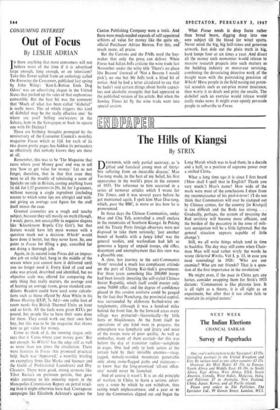The Hills of Kiangsi
By STRIX
DESCRIBED, with only partial accuracy, as 'a gifted and fanatical young man of thirty- five suffering from an incurable disease,' Mao Tse-tung made, to the best of my belief, his first appearance in the world's press in the autumn of 1933. The reference to him occurred in a series of turnover articles which I wrote for The Times, and it was several years before he got mentioned again. I spelt him Mao Dsu-tung, which, pace the BBC, is more or less how he is pronounced.
In those days the Chinese Communists, under Mao and Chu Teh, controlled a small enclave in the mountains of Southern Kiangsi. In Peking and the Treaty Ports foreign observers were not disposed to take them seriously; 'just another bunch of bandits with a fancy label' was the general verdict, and warlordism had left so generous a legacy of unpaid troops, old rifles, discontent and unemployment that this view was a plausible one.
A slow, hot journey to the anti-Communist `front' revealed a much less complacent attitude on the part of Chiang Kai-shek's government. For three years something like 200,000 troops had been loosely investing the self-styled Chinese Soviet Republic, which itself could muster only some 70,000 rifles; and the degree of confidence placed in this cordon sanitaire could be gauged by the fact that Nanchang, the provincial capital, was surrounded by elaborate barbed-wire en- tanglements, although it was a hundred miles behind the front line. In the forward areas every village was protected—theoretically—by little forts or blockhouses. At the front itself no operations of any kind were in progress; the atmosphere was lymphatic and jittery and most of the troops were of poor quality. As well as umbrellas, many of them carried—for this was before the day of transistor radios—songbirds'- in cages. One had only to look across at the terrain held by their invisible enemies—steep, jagged, densely-wooded mountains penetrable only along stone-flagged paths and staircases— to know that the long-promised 'all-out offen- sive' would never be launched.
And of course it wasn't. It is an old principle of warfare in China to leave a serious adver- sary a route by which he can withdraw, thus saving much unpleasantness; and a year or go later the Communists slipped out and began the Long March which was to lead them, in a decade and a half, to a position of supreme power over a unified China.
What a long time ago it is since I first heard ('How shall I spell that in English? Thank you very much.') Mao's name! How wide of the mark were most of the conclusions I drew from my reconnaissance of his pied-a-terrel CI do not think that Communism will ever be stamped out by Chinese armies, for the country [in Kiangsi] is too difficult and the Reds too strong. . . . Gradually, perhaps, the system of investing the Red territory will become more efficient, and the burden of the peasantry in the zone of mili- tary occupation will be a little lightened. But the general situation appears capable of little change.') Still, we all write things which tend in time to backfire. The day may still come when Chair- man Mao will read rather wryly the words he wrote (Selected Works, Vol I, p. 13, in case you need reminding) in 1926: 'Who are our enemies? Who are our friends? That is a ques- tion of the first importance in the revolution.'
He might even, if the pace in China gets any hotter, consider swapping them for Strix's 1933 dictum: 'Communism is like platonic love. It is all right as a theory, it is all right as an experiment, but after that it too often fails to maintain its original nature.'






























 Previous page
Previous page